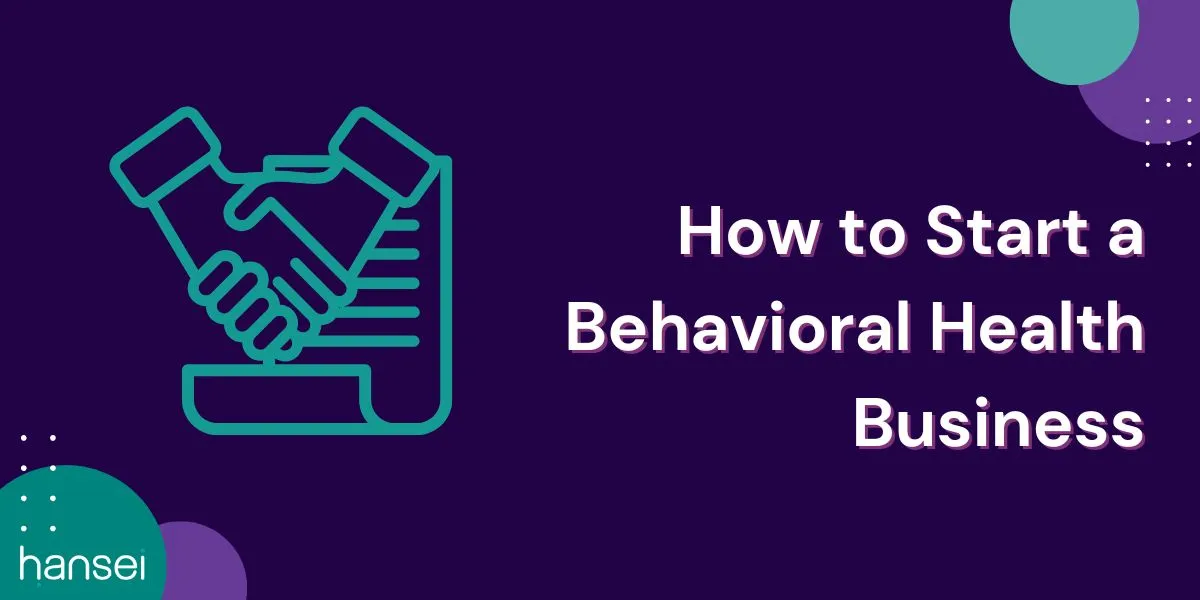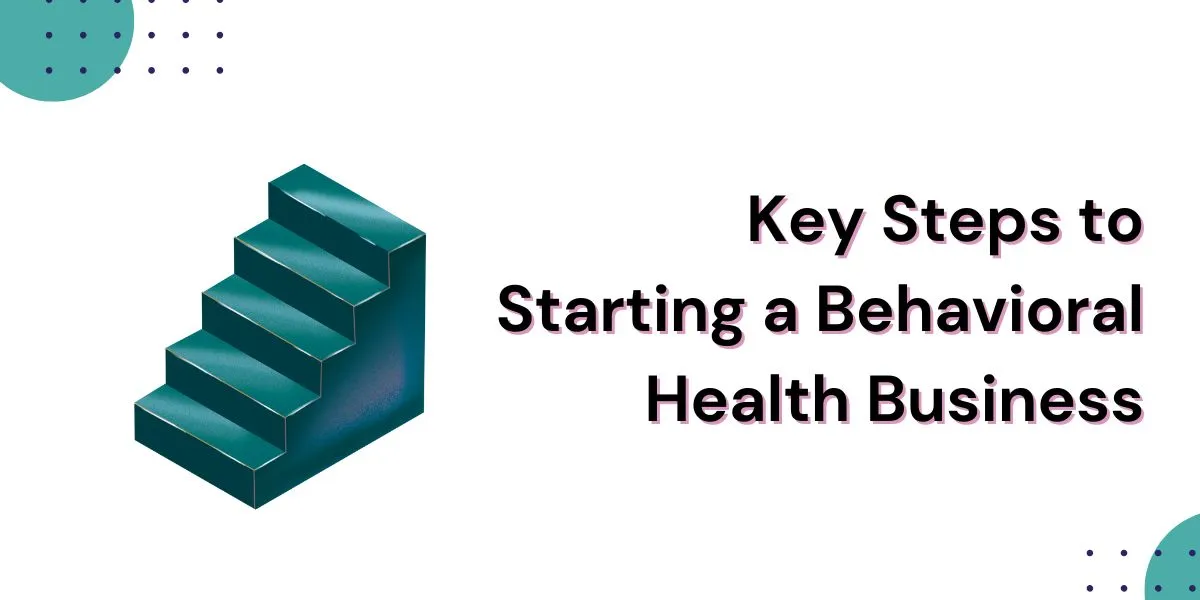Blog

Learning how to start a behavioral health business is both an exciting and complex journey. As mental health needs continue to surge across the United States, demand for behavioral health services has never been higher. According to the National Alliance on Mental Illness, one in five U.S. adults experiences mental illness each year, while nearly 60% of those individuals receive no treatment. This significant care gap creates both a business opportunity and an ethical imperative for providers who want to make a difference.
At Hansei Solutions, we work with behavioral health providers across the country, helping them navigate not just billing and revenue cycle management, but also the broader considerations that go into starting and running a behavioral health business.

Key Steps to Starting a Behavioral Health Business
Starting a behavioral health business is an exciting opportunity to make a meaningful impact while meeting the growing demand for mental health services. Yet turning your vision into a successful practice requires careful planning, regulatory knowledge, and strategic decision-making. Understanding the essential steps involved can help you launch your business with confidence and set the stage for long-term sustainability.
Conducting Market Research and Business Planning
A critical first step in learning how to start a behavioral health business is thorough market research. You need to determine what types of services are in demand in your community. For instance, are you planning to focus on outpatient therapy, intensive outpatient programs (IOP), partial hospitalization programs (PHP), residential treatment, or specialized services like dual diagnosis or trauma therapy?
A solid business plan should detail your target population, service offerings, competitive landscape, pricing structure, and projected financials. Your plan will serve as a roadmap not only for launching your business but also for attracting investors, securing loans, or negotiating with potential partners.
Licensing, Accreditation, and Compliance
Launching a behavioral health business requires careful attention to state licensing and federal regulations. Each state has its own rules for behavioral health facilities, including requirements for facility standards, staff qualifications, and patient record-keeping.
Many providers also choose to pursue accreditation from organizations like The Joint Commission or CARF International. Accreditation demonstrates your commitment to high-quality care, and some insurance companies require it for reimbursement. According to The Joint Commission, over 22,000 health care organizations in the U.S. have earned their accreditation, improving patient outcomes and operational efficiency.
Compliance isn’t optional—it’s essential. Behavioral health businesses must comply with HIPAA privacy laws, OSHA workplace safety rules, and numerous other federal and state requirements. Hansei Solutions often helps clients navigate these complexities, ensuring that billing practices, clinical documentation, and operational workflows align with legal and regulatory standards.
Finding and Building Your Team
Your staff will be the backbone of your behavioral health business. You’ll need to recruit licensed professionals, such as psychologists, psychiatrists, licensed clinical social workers, marriage and family therapists, substance abuse counselors, and administrative personnel experienced in behavioral health billing and compliance.
Retention is equally important. The mental health field suffers from significant burnout rates. Studies from the American Psychological Association show that demand for mental health services has increased dramatically, leaving providers overextended. Cultivating a positive workplace culture, offering competitive salaries, and supporting staff well-being are crucial for long-term sustainability.
Securing Funding and Financial Planning
Starting a behavioral health business can be expensive. Startup costs might include leasing or renovating a facility, purchasing electronic health record (EHR) software, hiring staff, and obtaining insurance. Many new facilities also need capital reserves to cover operating costs during the initial months while insurance claims are processed.
Funding may come from personal savings, business loans, investors, or even grants for mental health services. Accurate financial forecasting is critical. You’ll need to account for payer mix, expected reimbursement rates, and average days in accounts receivable. At Hansei Solutions, we work with new behavioral health businesses to build financial models that reflect realistic cash flow projections and sustainable revenue cycles.
Implementing Billing and Revenue Cycle Management
A major factor in how to start a behavioral health business—and keep it running—is establishing a robust billing and revenue cycle management process. Behavioral health billing is notoriously complex due to frequent changes in payer requirements, evolving telehealth rules, and unique documentation demands.
Many startups mistakenly underestimate how much expertise is needed in this area. According to Milliman, behavioral health claims are denied at rates significantly higher than physical health claims, increasing revenue risk. Partnering with a revenue cycle management specialist like Hansei Solutions can help ensure your business submits clean claims, reduces denials, and accelerates cash flow.

Staying Competitive in the Behavioral Health Space
Once your business is operational, staying competitive means continually assessing your market and innovating your services. Consider offering specialized programs, such as trauma-focused therapy, LGBTQIA+ support groups, or telehealth services for rural areas. Diversifying your services can help your business reach new patient populations and differentiate itself from competitors.
Digital marketing is also crucial. Your website should clearly explain your services, make it easy for clients to contact you, and include SEO-optimized content like resource pages and blogs. Partnering with marketing professionals who understand behavioral health regulations can prevent costly compliance mistakes in advertising.
Thriving as a New Behavioral Health Business
Building a behavioral health business is not for the faint of heart. It requires a unique blend of clinical expertise, regulatory knowledge, operational skill, and financial discipline. Yet the rewards are equally significant. Providers who successfully navigate how to start a behavioral health business have the opportunity to make a lasting impact on individuals, families, and entire communities.
At Hansei Solutions, we partner with new behavioral health businesses at every step of the journey, from initial planning and licensing to revenue cycle management and financial sustainability. If you’re considering starting a behavioral health business, we’re here to guide you through the challenges so you can focus on delivering exceptional care.
Frequently Asked Questions (FAQs) About Starting a Behavioral Health Business
How much does it cost to start a behavioral health business?
Startup costs vary significantly depending on location, size, and services. Many facilities need anywhere from $100,000 to several million dollars, accounting for leasing, staff salaries, EHR systems, licensing, and working capital.
Do I need accreditation to start a behavioral health business?
Accreditation isn’t legally required to open a behavioral health business in all states. However, many insurance companies require accreditation for credentialing and reimbursement, and it helps establish credibility and quality standards.
Can I offer telehealth services as a new behavioral health business?
Yes. Telehealth has expanded significantly since the COVID-19 pandemic. However, laws and payer policies vary by state and insurance provider, so confirm regulations and reimbursement guidelines before launching telehealth services.
How long does it take to open a behavioral health facility?
Timelines vary but typically range from six months to over a year, depending on licensing approvals, construction or leasehold improvements, hiring staff, and payer credentialing processes.
Why is behavioral health billing so complex?
Behavioral health billing involves unique coding, payer rules, and stringent documentation requirements. High denial rates, evolving telehealth regulations, and variable reimbursement rates make expert billing support essential for financial success.
Getting Started With Hansei Solutions
Building a behavioral health business takes dedication, expertise, and a clear roadmap—but the rewards are profound. By combining your clinical skills with strong business planning and reliable revenue cycle management, you can create a practice that changes lives and thrives financially. At Hansei Solutions, we’re here to guide you through every phase of your journey, from planning and licensing to billing and compliance.

Ready to focus on providing healthcare? Let us lighten your load.
We’re here to address your pain points and create growth opportunities for your organization. We’re passionate about what we do, and it shows in every interaction. Learn what makes us tick and schedule a demo today.